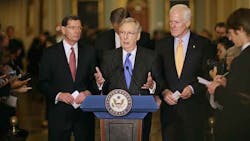Congress Easily Passes $1.1 Trillion Spending Bill
WASHINGTON—Congress approved a compromise $1.1 trillion spending package Friday that funds the government through next September, while also tightening the nation's visa requirements, ending a longstanding oil export ban and reforming the IMF.
The sprawling measure, which also extends several tax exemptions worth more than $600 billion and that critics warn will increase the national debt, easily passed the Senate 65 votes to 33 shortly after clearing the House earlier Friday as the last major acts of Congress before year-end holidays.
It now goes to President Barack Obama, and the White House has signaled he will sign the legislation into law.
Architects of the deal and congressional leaders worked overtime this week, cajoling rank-and-file members on both sides into backing the $1.149 trillion, catch-all bill which came in at more than 2,000 pages.
Known as an "omnibus," the fiscal year 2016 spending bill includes priorities of both parties, and left out some pet projects that made it difficult for some lawmakers to sign on.
But ultimately, "the House came together to ensure our government is open and working for the American people," House Speaker Paul Ryan said after that chamber's vote.
The bill increases defense spending, which Republicans said was critical given the level of unrest in the Middle East and the increased specter of terrorism.
"The legislation strengthens our military and protects Americans from terrorist threats, while limiting the overreach of intrusive government bureaucracies like the Internal Revenue Service and the Environmental Protection Agency," Ryan said.
The omnibus lifts the 40-year-old ban on U.S. crude oil exports, for years a Republican priority, while extending solar and wind energy tax credits that Democrats say will create renewable energy jobs and reduce carbon emissions.
The bill reforms the U.S. visa waiver program in the wake of deadly attacks in Paris and San Bernardino, California, and intensifies U.S. cyber security efforts.
It does not, however, include a controversial measure temporarily halting the program that allows Syrian and Iraqi refugees to enter the United States.
Senator Rand Paul, a Republican presidential candidate, opposed the "reckless" spending bill, saying it will do "nothing to stop the flow of refugees from terrorist countries" and just "adds debt on top of debt and enables President Obama's lawlessness."
Tax Relief Passes Too
The omnibus retained the decades-long ban on federal funding for research into gun violence, a major point of contention for Democrats. It also failed to provide assistance for debt-crippled Puerto Rico, which left top House Democrat Nancy Pelosi fuming although she ultimately backed the deal.
It also includes a two-year moratorium on the so-called medical device tax, a provision of Obama's health care law that angered Republicans and Democrats alike. And it delays until 2020 the implementation of the Cadillac tax, a 40% tax on health plans that cost companies more than $10,200 per worker and was initially to take effect in 2018.
The Senate also passed a sweeping package extending tax breaks and credits worth $629 billion aimed at providing greater certainty for businesses and millions of Americans.
The House approved the measure Thursday.
Jay Timmons, president and CEO National Association of Manufacturers, in a statement lauded the bill's passage as "a victory for American workers and middle-class families, and a victory that manufacturers worked hard to deliver.
Particularly favorable to manufacturers, Timmons stated, are the bill's extension of the Research and Development tax credit, the extension of bonus depreciation and enhanced write-offs for small businesses, the Cadillac tax delay, the medical device tax suspension, the crude oil export ban lifting and the repeal of Country-of-Origin labeling provisions.
The bill includes 56 extensions, among them nearly two dozen that would be made permanent in part to help families still struggling in the aftermath of the financial crisis.
Several Democrats, including party leaders in the House, opposed the bill, warning it is not paid for and will only deepen U.S. debt.
Their opposition puts them at odds with the White House, which on Wednesday announced its support for the tax bill as well as the spending bill.
Senator Ron Wyden, the top Democrat on the Finance Committee, hailed it as "the biggest anti-poverty plan Congress has moved forward in decades," and said it will provide relief for 50 million Americans.
Copyright Agence France-Presse, 2015
About the Author
Agence France-Presse
Copyright Agence France-Presse, 2002-2025. AFP text, photos, graphics and logos shall not be reproduced, published, broadcast, rewritten for broadcast or publication or redistributed directly or indirectly in any medium. AFP shall not be held liable for any delays, inaccuracies, errors or omissions in any AFP content, or for any actions taken in consequence.
IW Staff
Find contact information for the IndustryWeek staff: Contact IndustryWeek
